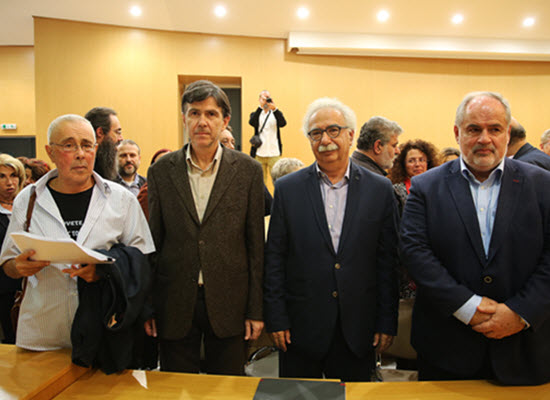
14-12-16 Gavroglou outlines three-year education reform plan, increased spending
In a wide-ranging news conference, Education, Research, and Religious Affairs Minister Costas Gavroglou outlined the government’s three-year reform plan at the ministry today.
Gavroglou first presented an overview of the reforms already instituted in the government’s two-year tenure, which aim at democratising, upgrading and restoring some of the huge (34 %) budget cuts in education during the seven- year economic crisis.
He noted as accomplishments the new hourly programmes, the new, revamped vocational high school, the augmentation of subjects and classes at 2,218 schools, the drastic reduction of the junior high school examinations load, the new programmes (in religion, foreign languages, etc.) , the uniform primary school, the upgrading of special education , afternoon auxiliary tutoring at junior high schools, and induction classes for the education of refugees.
The minister stressed the 257 euro increase in education spending (a 5.3 percent increase, or half a percentage point of GDP in the 2017 budget.
Primary School Reforms
Planned primary school reforms include extension of the all-day programme to more schools, the addition of an extra year of mandatory education, and the addition of courses in afternoon hours at all-day schools.
Secondary School Reforms
Planned reforms include extending mandatory education through high school, reform of the hourly programme, and reform of the university admissions process.
By March, the Institute of Educational Policy, the ministry’s educational planning and policy organ, will table in parliament (educational affairs committee) the plans for high school and university admission reforms, including upgrading the educational offering in the last two years of high school, establishment of the national high school diploma, the abolition of nationwide Panellinies university entrance exams, and an overehaul of the first-year university curriculum.
The ministry plans a procedure for the internal evaluation of and planning in schools, by offering teachers’ associations greater authority and increasing the autonomy of schools, thus limiting administrative red tape.
University/Tertiary Education
A key reform is the establishment of the unified education and research programme. The ministry has identified 16 problems here that will be discussed by a meeting of rectors on 14 January, and later by heads of Tertiary Technical Schools (TEI). Gavroglou has discussed with the finance industry ways to de-link the Special Account for Research from the national budget. The ministry will also submit a bill on graduate studies’ reforms, and Gavroglou noted the hiring of 1,000 teaching staff and the awarding of 2,500 scholarships.
